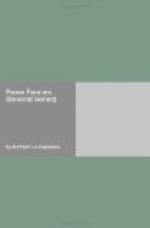Sebastian van Storck refused ‘to be or do any limited thing,’ but the answer to his mysticism is to be found in a finer mysticism, that which says that there is no limited act or thing, but that the significance, as well as the pathos, of eternity is in our smallest joys and sorrows, as in our most everyday transactions, and the greatness of God incarnate in His humblest child.
This, the old doctrine of the microcosm, seems in certain moments, moments one would wish to say, of divination, strangely plain and clear—when, in Blake’s words, it seems so easy to
’... see a world in a grain of sand,
And a heaven in a wild flower;
Hold infinity in the palm of your hand
And Eternity in an hour.’
Perhaps in the street, an effect of light, a passing face, yes, even the plaintive grind of a street organ, some such everyday circumstance, affects you suddenly in quite a strange way. It has become universalised. It is no longer a detail of the Strand, but a cryptic symbol of human life. It has been transfigured into a thing of infinite pathos and infinite beauty, and, sad or glad, brings to you an inexplicable sense of peace, an unshakable conviction that man is a spirit, that his life is indeed of supreme and lovely significance, and that his destiny is secure and blessed.
Matthew Arnold, ever sensitive to such spiritual states, has described these trance-like visitations in ’The Buried Life’—
’Only, but this is rare—
When a beloved hand is laid in ours,
When, jaded with the rush and glare
Of the interminable hours,
Our eyes can in another’s eyes read
clear,
When our world-deafen’d ear
Is by the tones of a loved voice caress’d—
A bolt is shot back somewhere in our breast,
And a lost pulse of feeling stirs again:
The eye sinks inward, and the heart lies
plain,
And what we mean, we say, and what we
would, we know.
A man becomes aware of his life’s
flow,
And hears its winding murmur; and he sees
The meadows where it glides, the sun,
the breeze.
’And there arrives a lull in the
hot race
Wherein he doth for ever chase
That flying and elusive shadow, rest.
An air of coolness plays upon his face,
And an unwonted calm pervades his breast.
And then he thinks he knows
The hills where his life rose,
And the sea where it goes.’




